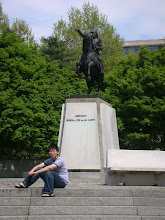.gif)
Dear Sirs and Madams,
As results come in from all over Europe for the European Union Parliament elections, I have a quick shout out to those that live in EU member states.
Denizens of the EU have a crucial role in this time of increasing volatility. The $50 billion of agricultural subsidies from the European Union are keeping other farmers in much worse of regions of the world from being able to access the food market. Their despair will transform into violence as it did for the fisherman in Somalia.
European Union and its member governments’ refusal to confront the fishing lobbies and decommission the excess boats encourages mass poaching in areas like Senegal and Somalia. One must recognize that this is a self destructive act that will only decrease the available fish in waters around Europe. As the Senegalese starve and the Somalis take up arms against international shipping, the European fishing boats are digging their own graves.
However, it is not just those beyond the borders of the European Union that face injustices waged upon them, sanctioned by the EU. There has to be a system of accountability which ensures the practice of adopted legislations regarding human rights and equal treatment. I do not wish the European Union to take on more federal power, so I beseech individuals in the EU to take it upon themelves to demand from their governments to ensure the liberty, equality, and justice for all.
All, including immigrants and refugees, many of whom have escaped hell-on-earth only to find themselves in shanty towns made of card board boxes, hunted down by the host government and ostracized by the local communities. Redistribution of wealth from the rich to the poor will inevitably occur under a free market and it is the most efficient, moral, and peaceful way to make the whole world a lot more prosperous. Your alternative is to await the violence unleashed by honest, hard working people whose only fault is that they were on the receiving end of the unfair and illiberal market conditions. I assure you that the losses in the former scenario to be insignificant, especially compared to the latter. Besides for the European nations whose population is decreasing who will pay for today’s young when they become pensioners?
Lastly, take the first step to disestablish NATO. There is no reason for its existence nor a European Union army, it will only provoke further tensions with Russia. Russia could probably use some help from the European Union. If people are so concerned with immigrants maybe Europe should look into diagnosing the issues after complaining about the symptoms for so long.
That goes for everything else as well.
Ah, I rant.
I hope you will not find offense in the above criticisms. I have tremendous respect for the European Union’s stance on all sort of things from humane treatment of animals to its position on ensuring the safety of food products. However, certain actions undertaken by the EU really damages the world and I believe it is important for the constituents of the EU to recognize those serious problems. The Common Agricultural Policy is under review regarding its subsidies and it has been promised to the world that it will be diminished. The Economist picked up the problem with fishing and it should be now on the minds of the politicians who have the means to change the situation. Everything necessary for Europe to finally lurch forward on the liberal path to global prosperity is present. Now the European Union constituents must send the right people into power.
They better, the livelihoods of many people depend on it.
I wish the old continent good luck.
Best,
Yong Kwon




